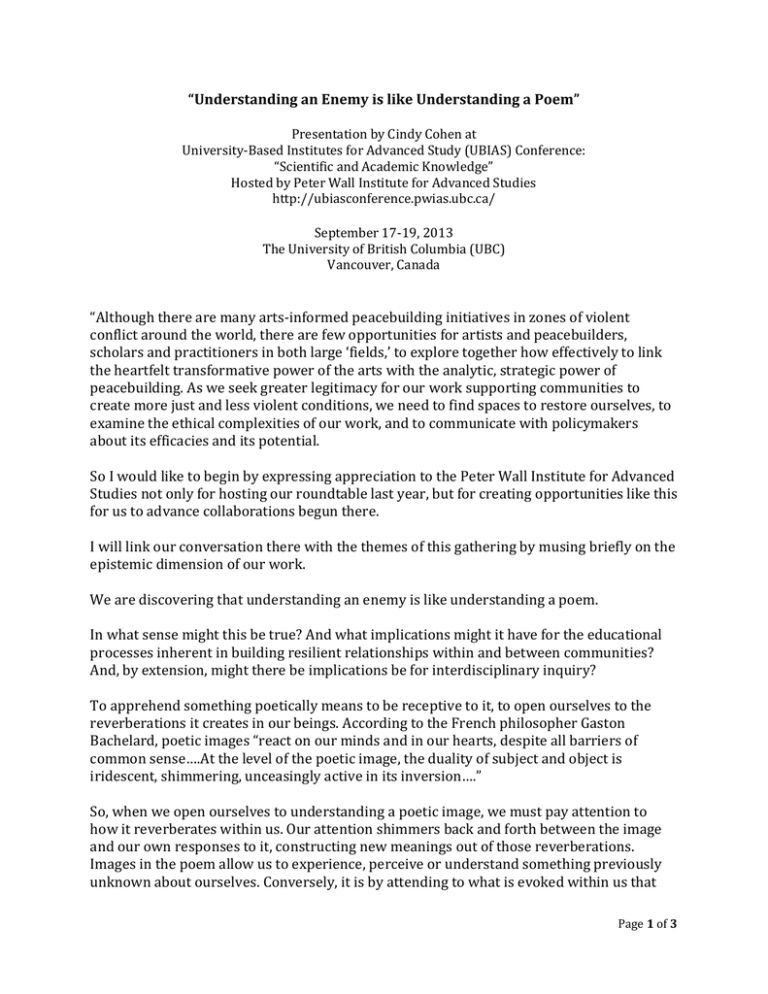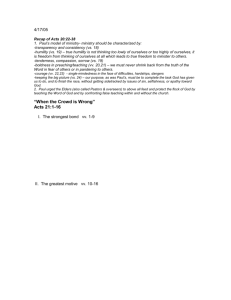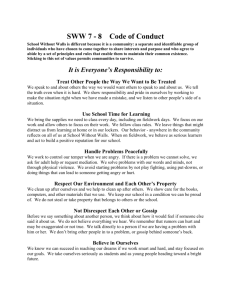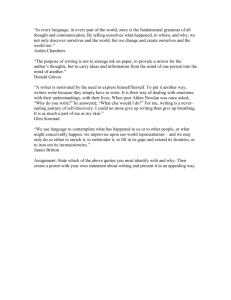“Understanding an Enemy is like Understanding a Poem”
advertisement

“Understanding an Enemy is like Understanding a Poem” Presentation by Cindy Cohen at University-Based Institutes for Advanced Study (UBIAS) Conference: “Scientific and Academic Knowledge” Hosted by Peter Wall Institute for Advanced Studies http://ubiasconference.pwias.ubc.ca/ September 17-19, 2013 The University of British Columbia (UBC) Vancouver, Canada “Although there are many arts-informed peacebuilding initiatives in zones of violent conflict around the world, there are few opportunities for artists and peacebuilders, scholars and practitioners in both large ‘fields,’ to explore together how effectively to link the heartfelt transformative power of the arts with the analytic, strategic power of peacebuilding. As we seek greater legitimacy for our work supporting communities to create more just and less violent conditions, we need to find spaces to restore ourselves, to examine the ethical complexities of our work, and to communicate with policymakers about its efficacies and its potential. So I would like to begin by expressing appreciation to the Peter Wall Institute for Advanced Studies not only for hosting our roundtable last year, but for creating opportunities like this for us to advance collaborations begun there. I will link our conversation there with the themes of this gathering by musing briefly on the epistemic dimension of our work. We are discovering that understanding an enemy is like understanding a poem. In what sense might this be true? And what implications might it have for the educational processes inherent in building resilient relationships within and between communities? And, by extension, might there be implications be for interdisciplinary inquiry? To apprehend something poetically means to be receptive to it, to open ourselves to the reverberations it creates in our beings. According to the French philosopher Gaston Bachelard, poetic images “react on our minds and in our hearts, despite all barriers of common sense….At the level of the poetic image, the duality of subject and object is iridescent, shimmering, unceasingly active in its inversion….” So, when we open ourselves to understanding a poetic image, we must pay attention to how it reverberates within us. Our attention shimmers back and forth between the image and our own responses to it, constructing new meanings out of those reverberations. Images in the poem allow us to experience, perceive or understand something previously unknown about ourselves. Conversely, it is by attending to what is evoked within us that Page 1 of 3 we are able to understand the poetic image. Bachelard refers to this kind of understanding of self and other THROUGH each other as trans-subjectivity. The deepening of relationships between former enemies also involves trans-subjectivity, an epistemological and ethical interdependence that results from the features of enmity itself. In contexts of violence and oppression, ethnic identity is developed in part by the externalization of pleasurable and wholly good impulses onto the symbols of the in-group; unpleasurable phenomena and impulse are attached to symbols associated with the enemy. In this way, enemies serve as a kind of reservoir of unwanted aspects of our selves. Unconsciously they are like us, although on a conscious level they should not be the same since they contain those characteristics of ourselves we vigorously reject. Because our enemies have become receptacles for the negatively valued attributes of ourselves, to perceive our enemies more fully entails revising our understanding of ourselves as well, embracing the shadow sides of our selves and of the communities within which we are intersubjectively linked. Shifting between self and other to remake images of each, the work of overcoming an enmity system mirrors the shimmering of attention between the poetic image and our own response. The arts help us cultivate receptivity and other qualities of presence that allow us to build relationships of reciprocity and trust. As some of us experienced yesterday in a visit to the remarkable Truth and Reconciliation yesterday, there are many truths that will be spoken only when a sufficient level of trust and trustworthiness has been earned. The interdisciplinary inquiries manifested and described at this conference seem to ask of us a kind of transsubjectivity similar to that involved in understanding both poems and enemies, with our attention tacking back and forth, or shimmering, between the new fields we are hearing about and the assumptions and modes of knowledge-construction in our disciplines. As in the work of facilitating respectful cross-cultural encounters, true interdisciplinary collaborations require a kind of epistemic humility that balances concerns for the integrity of our field with the recognition of interdependence with other fields that operate on very different assumptions. We need each other to solve pressing problems; but understanding each other challenges us to admit and examine the limitations and the ethical shadows of our own disciplines. One of the tasks of our roundtable last fall was to explore how to strengthen the work being done at the nexus of arts, culture and social transformation. Members of one task group articulated a vision for a vibrant and resilient Social Transformation through the Arts field and a blueprint for its infrastructure. Key components would be: • • • anchor places which can act as centers for innovation; anchor individuals, who create and sustain networks; regional hubs that are centers of initiating energy; Page 2 of 3 • • regular convenings of participants for cross-disciplinary and cross-regional fertilization of ideas; and articulation of principles and professional ethics. In the month following the roundtable here at UBC, several of us were able to bring these ideas to the Arts and Peace Commission of the International Peace Research Association which met at Mie University in Japan. There, we were able to link another set of networks into what appears to be an emerging field. We would like to invite artists and scholars affiliated with any university-based institutes for advanced studies to join our inquiry into the contributions of arts and culture to social transformation and to the creative transformation of violent conflict. The on-going work of Michelle LeBaron and her colleagues here make UBC and the Peter Wall Institute a vital anchor of this field, and we wonder if there might be possibilities for connecting with colleagues in your universities and communities who are engaged in similar inquiries and who could benefit from interaction and exchange. If so, we are interested in exploring possibilities for on-going connections.” Page 3 of 3



